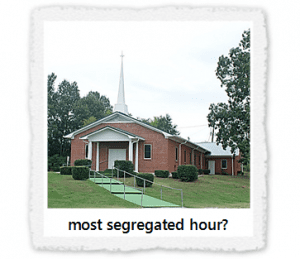
- As a child, if I had to choose, I would have said that I felt safer around Eddie than I did around my own grandfather. And he gave me a golf ball once.
We are a family of white people. And we know that. On MLK Day we read stories to our children about civil rights. I preached about the wonder of diversity. And my wife and I watched The Help, a riveting story about how African-American domestic workers were treated in the South in the 1960s.
My family is from Mississippi. I never knew why my grandparents had a tiny bathroom in the garage. Now I know. It was for the Nancy, the housekeeper, and Eddie, the farmhand. I have a vivid memory as a small child from my summer visits to Mississippi. Eddie, the African-American who worked for my grandfather, had lost the pin that connected the bush hog to the tractor. I was standing next to my grandfather’s Chevy pick-up, embarrassed, as he angrily berated Eddie. “Grandpaps” was a member of First mainline church downtown and Eddie was a member of Ebenezer church in the country. Evidently gracious Christian behavior did not apply to the hired help.
I recently preached from a book of the Bible called Galatians. It is a letter from Paul, the first-century church planter, to a new church in Asia Minor (what is now Turkey). Paul was upset because certain church leaders had turned away from the unconditional love of God demonstrated in Jesus Christ, back to the particular requirements of the Old Testament Law. In everyday practice, they went from “God loves you just the way you are and so do we” to “you must meet these requirements to be good enough for us.” The difference is staggering.
A church that practices “we love you just the way you are” is a delightful and life-changing place. It is a safe place of joyous freedom and tremendous relief. For so many of us who have never felt fully loved and accepted by family members, spouses and employers, a truly gracious church is a deeply satisfying spiritual oasis. A group of people like this embodies the heart of God who would send his own son, no strings attached, to rescue us.
Towards the end of this letter to the little church in Galatia, Paul tells them what to do if someone messes up. Criticize? Yell? Shame? No. In a nutshell he says, ‘if you are up to it, help restore them gently, but be careful because you’re not perfect either. Help carry each other along the way.’ Sounds wonderful – the way all imperfect people would like to be treated.
As followers of Christ, the question for us is this: do we love others as He loves us? Do we have the right to pick and choose who we treat graciously? Does skin color, employment status or performance standards overrule loving others as God has loved us? Do you love your vulnerable ones and the people who work for you—in your home, company and church – with the same ‘carry each other’ way that Paul describes? I hope you do. And I hope I do. There are a lot of Eddies out there – and we need to show them that they are dearly loved by God.
